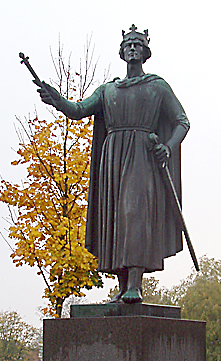<Back to Index>
- Philosopher George Ivanovich Gurdjieff, 1866
- Painter Jean Baptiste van Loo, 1684
- King of Denmark Valdemar I the Great, 1131
PAGE SPONSOR

Valdemar I of Denmark (14 January 1131 – 12 May 1182), also known as Valdemar the Great, was King of Denmark from 1157 until 1182.
He was the son of Canute Lavard, a chivalrous and popular Danish prince, who was the eldest son of Eric I of Denmark. Valdemar's father was murdered by Magnus the Strong days before the birth of Valdemar; his mother, Ingeborg of Kiev, daughter of Mstislav I of Kiev and Christina Ingesdotter of Sweden, named him after her grandfather, Vladimir Monomakh of Kiev.
As an heir to the throne, and with his rivals quickly gaining power, he was raised in the court of Asser Rig of Fjenneslev, together with Asser's sons, Absalon and Esbern Snare, who would become his trusted friends and ministers.
In 1146, when Valdemar was fifteen years old, King Erik III Lamb abdicated and a civil war erupted. The pretenders to the throne were: Sweyn III Grathe, son of Eric II Emune, son of Eric I. Canute V, son of Magnus the Strong who was the son of King Niels, who was the brother of Erik I. Valdemar himself held Jutland, at least Schleswig, as his possession. The civil war lasted the better part of ten years.
In
1157, the three agreed to part the country in three among themselves.
Sweyn hosted a great banquet for Canute, Absalon, and Valdemar during
which he planned to dispose of all of them. Canute was killed, but
Absalon and Valdemar escaped. Valdemar returned to Jutland. Sweyn
quickly launched an invasion, only to be defeated by Valdemar in the Battle of Grathe Heath. He was killed during flight, supposedly by a group of peasants who
stumbled upon him as he was fleeing from the battlefield. Valdemar,
having outlived all his rival pretenders, became the sole King of
Denmark. In 1158 Absalon was elected Bishop of Roskilde,
and Valdemar made him his chief friend and advisor. He reorganized and
rebuilt war torn Denmark. At Absalon's instigation he declared war upon
the Wends who were raiding the Danish coasts. They inhabited Pomerania and the island of Rügen in the Baltic Sea. In 1168 the Wendish capital, Arkona, was taken, and the Wends became Christians and subject to Danish suzerainty. Danish influence reached into Pomerania. Valdemar's reign saw the rise of Denmark, which reached its zenith under his second son Valdemar II. Valdemar married Sophia of Minsk (c. 1141 – 1198), half - sister of Canute V of Denmark and daughter of Dowager Queen Rikissa of Sweden from her marriage with Volodar of Minsk (Vladimir or Volodar Glebovich of the Rurikids, died 1167), ruling Prince of Principality of Minsk, and they had the eight children. His widow Sophia married then Louis III, Landgrave of Thuringia.